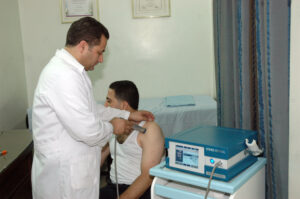Planter Fasciitis
Heel pain is a common complaint with several different causes. One of the major causes is inflammation of the tissues at the bottom of the foot, which is known as plantar fasciitis.
Plantar aponeurosis, which is a type of connective tissue, stretches under the skin across the arch of the foot from the heel to the base of the metatarsals. When these tissues are torn, exposed to excessive stress, or stretched inappropriately, they can become inflamed and cause a condition known as fasciitis.
Pain, discomfort, and tenderness are common symptoms of plantar fasciitis, which is more likely to develop in obese individuals, women, those over 40 years old, and people who spend extended periods on their feet. Athletes who frequently run or jump are also at risk of developing the condition.
Plantar fasciitis can sometimes be associated with a calcaneal spur, which is an excess bone growth on the heel and can cause pain. Surgery may be required in severe cases.
 Symptoms of plantar fasciitis:
Symptoms of plantar fasciitis:
- Heel pain, especially in the morning or after rest.
- Pain increases with standing.
- Also, pain in the heel after exercise.
Treatment of plantar fasciitis:
- Take a break from intense physical exertion.
- Plantar arch supports, also known as splints, can be placed inside shoes to provide support.
- Additionally, stretching the calf muscles and Achilles tendon can be helpful.
- Extracorporeal Shockwave Therapy is usually applied in three or five sessions, and the recovery rate is very high.
- Ice bags.
- Non-steroidal anti-inflammatory drugs.
- Reducing excess weight.
- Local cortisone injections may help in specific cases.
- Surgery may help in cases where other treatments are difficult.
 Other causes of heel pain:
Other causes of heel pain:
It’s essential to understand that heel pain doesn’t necessarily indicate plantar fasciitis. Several medical conditions can cause pain in the foot and heel. For instance, severe illnesses like diabetes and vascular disease can lead to heel pain.
Heel pain can be caused by a variety of conditions including arthritis, traumatic injuries, sprains, gout, and stress fractures which are caused by repetitive stress on the bones. However, it is rare for tumors (benign or malignant) or bacterial infections to cause heel pain. If you experience persistent heel pain, it is important to consult your doctor for a thorough evaluation.
Dr. Fayez Fathi Orabi
Consultant in Physical Medicince and Rehabilitaion

